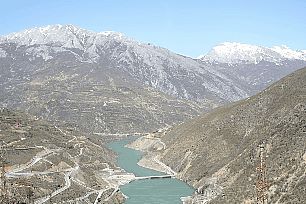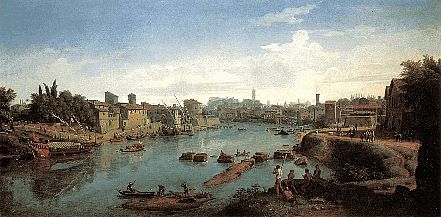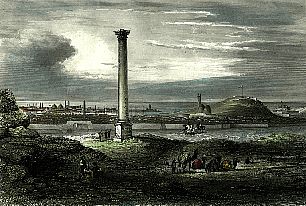Revisited
Stories In The Names Of Places

|
Editor's note: This article is a reprint from "Stories That Words Tell Us" By Elizabeth O'Neill. It was originally published in 1918.  White covered mountains of Albania The stories which the names of places can tell us are many more in number, and even more wonderful, than the stories in the names of people. Some places have very old names, and others have quite new ones, and the names have been given for all sorts of different reasons. If we take the names of the continents, we find that some of them come from far-off times, and were given by men who knew very little of what the world was like. The names Europe and Asia were given long ago by sailors belonging to the Semitic race (the race to which the Jews belong), who sailed up and down the Ægean Sea, and did not venture to leave its waters. All the land which lay to the west they called Ereb, which was their word for "sunset," or "west," and the land to the east they called Acu, which meant "sunrise," or "east;" and later, when men knew more about these lands, these names, changed a little, remained as the names of the great continents, Europe and Asia. Africa, too, is an old name, though not so old as these. We think of Africa now as a "dark continent," the greater part of which has only lately become known to white men, and with a native population of negroes. But for hundreds of years the north of Africa was one of the most civilized parts of the Roman Empire. Before that time part of it had belonged to the Carthaginians, whom the Romans conquered. Africa was a Carthaginian name, and was first used by the Romans as the name of the district round Carthage, and in time it came to be the name of the whole continent. America got its name in quite a different way. It was not until the fifteenth century that this great continent was discovered, and then it took its name, not from the brave Spaniard, Christopher Columbus, who first sailed across the "Sea of Darkness" to find it, but from Amerigo Vespucci, the man who first landed on the mainland. Australia got its name, which means "land of the south," from Portuguese and Spanish sailors, who reached its western coasts early in the sixteenth century. They never went inland, or made any settlements, but in the queer, inaccurate maps which early geographers made, they put down a Terra Australis, or "southern land," and later, when Englishmen did at last explore and colonize the continent, they kept this name Australia. This Latin name reminds us of the fact that Latin was in the Middle Ages the language used by all scholars in their writings, and names on maps were written in Latin too, and so a great modern continent like Australia came to have an old Latin name. There is a great deal of history in the names of countries. Take the names of the countries of Europe. England is the land of the Angles, and from this we learn that the Angles were the chief people of all the tribes who came over and settled in Britain after the Romans left it. They spread farthest over the land, and gave their name to it; just as the Franks, another of these Northern peoples, gave their name to France, and the Belgæ gave theirs to Belgium. The older name of Britain did not die out, but it was seldom used. It has really been used much more in modern times than it ever was in the Middle Ages. It is used especially in poetry or in fine writing, just as Briton is instead of Englishman, as in the line-- "Britons never, never, never shall be slaves." The name Briton is now used also to mean Irish, Scotch, and Welsh men--in fact, any British subject. We also speak of Great Britain, which means England and Scotland. When the Scottish Parliament was joined to the English in 1702 some name had to be found to describe the new "nation," and this was how the name Great Britain came into use, just as the United Kingdom was the name invented to describe Great Britain and Ireland together when the Irish Parliament too was joined to the English in 1804.  The Tiber river in Rome, near the Porto di Ripa Grande We see how Gaul and Britain, as France and England were called in Roman times, had their names changed after the fall of the Roman Empire; but most of the countries round the Mediterranean Sea kept their old names, just as they kept for the most part their old languages. Italy, Greece, and Spain all kept their old names, although new peoples flocked down into these lands too. But though new peoples came, in all these lands they learned the ways and languages of the older inhabitants, instead of changing everything, as the English did in Britain. And so it was quite natural that they should keep their own names too. Most of the other countries in Europe took their names from the people who settled there. Germany (the Roman Germania) was the part of Europe where most of the tribes of the German race settled down. The divisions of Germany, like Saxony, Bavaria, Frisia, were the parts of Germany where the German tribes known as Saxons, Bavarians, and Frisians settled. The name Austria comes from Osterreich, the German for "eastern kingdom." Holland, on the other hand, takes its name from the character of the land. It comes from holt, meaning "wood," and lant, meaning "land." The little country of Albania is so called from Alba, or "white," because of its snowy mountains. But perhaps the names of the old towns of the old world tell us the best stories of all. The greatest city the world has ever seen was Rome, and many scholars have quarrelled about the meaning of that great name. It seems most likely that it came from an old word meaning "river." It would be quite natural for the people of early Rome to give such a name to their city, for it was a most important fact to them that they had built their city just where it was on the river Tiber. One of the best places on which a town could be built, especially in early days, was the banks of a river, from which the people could get water, and by which the refuse and rubbish of the town could be carried away. Then, again, one of the chief things which helped Rome to greatness was her position on the river Tiber, far enough from the sea to be safe from the enemy raiders who infested the seas in those early days, and yet near enough to send her ships out to trade with other lands. Thus it was, probably, that a simple word meaning "river" came to be used as the name of the world's greatest city.  View of Pompey's Pillar with Alexandria in the background in c.1850 Others among the great cities of the ancient world were founded in a quite different way. The great conqueror, Alexander the Great, founded cities in every land he conquered, and their names remain even now to keep his memory alive. The city of Alexandria, on the north coast of Africa, was, of course, called after Alexander himself, and became after his death more civilized and important than any of the Greek cities which Alexander admired so much, and which he tried to imitate everywhere. Now Alexandria is no longer a centre of learning, but a fairly busy port. Only its name recalls the time when it helped in the great work for which Alexander built it--to spread Greek learning and Greek civilization over Europe and Asia. |
| Revisited - Stories In The Names Of Places | |||||
| Writer: | Elizabeth O'Neill | ||||
| Images: | |||||
| |||||
| Sources: | |||||
| |||||
All images are Copyright - CC BY-SA (Creative Commons Share Alike) by their respective owners, except for Petey, which is Public Domain (PD) or unless otherwise noted.
comments powered by Disqus



















